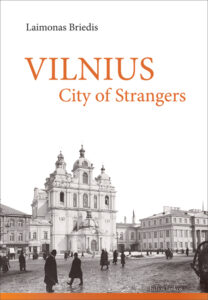Laimonas Briedis. Vilnius: City of Strangers; Vilnius savas ir svetimas

Laimonas Briedis Vilnius: City of Strangers. Budapest: Central European University Press, 2009, 296 pp.
Laimonas Briedis Vilnius savas ir svetimas, parts of the book translated by Laimantas Jonušys. Vilnius: Baltos lankos, 2010, 336 pp.
In all likelihood, Vilnius: City of Strangers by cultural geographer Laimonas Briedis – together with the almost contemporaneously appearing first two novels of the Silva rerum tetralogy by art historian Kristina Sabaliauskaitė, which has aroused and rekindled curiosity about the history of Vilnius – has started such a veritable upsurge in both fiction and non-fiction books about Vilnius and dedicated to Vilnius. (It has also led, in a way, to the emergence of the Vilnius Club Prize, intended to encourage Lithuanian and foreign authors to popularize and write about the city of Vilnius.)
Vilnius, the capital of Lithuania, is a city of myths and legends, having faced many rulers and survived ferocious onslaughts, fires, and plagues as well as memorable moments of glory. This city, with its resplendent history, has long been a point of intersection between the East and the West, the centre and the periphery, of different cultures, nations, and identities. “Cognition of Vilnius has no geographical, linguistic or historical boundaries. Vilnius is like water: bustling and always impermanent,” says Briedis, who has set out to tell the history of the city from the perspective of the other, of a stranger who only stays in the city for a while or travels through it.
The narrative of Vilnius is arranged chronologically starting from the myth of the city’s origin and its first mentions – the letters written in 1323-1324 by the Grand Duke Gediminas to the rest of Europe – to the 21st century, covering, on the way, both the most glorious and the most sombre ages of the history of Vilnius, Lithuania, and the whole of Europe. The most important narrators of the book are wanderers, conquerors, and distinguished guests, having either accidentally or intentionally visited the city at various times and for various purposes – all those who have looked at Vilnius through the eyes of a stranger and a traveller, including Johann Georg Adam Forster, Napoleon, Fyodor Dostoevsky, Stendal, Lev Tolstoy, Alfred Döblin, Mikhail Bachtin, Josef Brodsky and many others. Using their personal lives and previously (un)known details, Vilnian experiences and impressions, accounts recorded by contemporary Vilnius residents, events in the city, reflections on political and cultural contexts – from all this, Briedis weaves a narrative of Vilnius which unveils itself and can be read in novel ways, and which is supplemented by the book’s second layer – a cartographic story of Vilnius told through illustrations.
This book is just like Vilnius – full of interesting secrets and previously unknown details; canonical nuggets of knowledge about Vilnius here often shake off their dust and appear in a new and unexpected light. Briedis managed to capture and expose the multifaceted, diverse, and multi-ethnic face of Vilnius, without denying uncomfortable truths or strange circumstances; he has managed to create a textual space where ordinary people meet the great and the good, nobles meet commoners, and Catholics meet pagans. Where prose meets poetry and journeying meets the sedentary life. Historical facts, excerpts from sources, and testimonies of contemporary witnesses are presented with the precision and objectivity of a scholar, but this does not condemn Briedis’s narrative to the often dry and bland style of a monograph – the narrative is graceful and the book reads like a historical novel. Perhaps the playful spirit of all the nomads who have ever visited Vilnius – or indeed that of all travellers – which have created the aura of this city for many years is to thank for this.
Laimonas Briedis is a Vilnian who now lives in Vancouver, Canada. As a cultural geographer, he defended his dissertation at the University of British Columbia. His book Vilnius: City of Strangers, first published in English in 2009 by the Central European University Press, has attracted the interest of both the Western academic community and the foreign media. The Economist singled out Briedis’s book as a subtle and evocative portrait of the city. Briedis has continued his cartographic and literary research of Vilnius in the project ‘Geography of Literature: textual territories and imaginary maps’ and has taken part in the composition of maps of Vilnius literature.
Translations
Portuguese: Vilna, cidade dos outros. Translated from English by Fernando Klabin. Ayllon, 2021
Russian: Вильнюс город странников. Translated from Lithuanian by Taisija Oral. Moscow: Vysshaja Shkola Ekonomiki, 2020
German: Vilnius: Reisen in die ferne Nähe. Translated by Cornelius Hell. Klafenfurt: Wieser Verlag, 2017